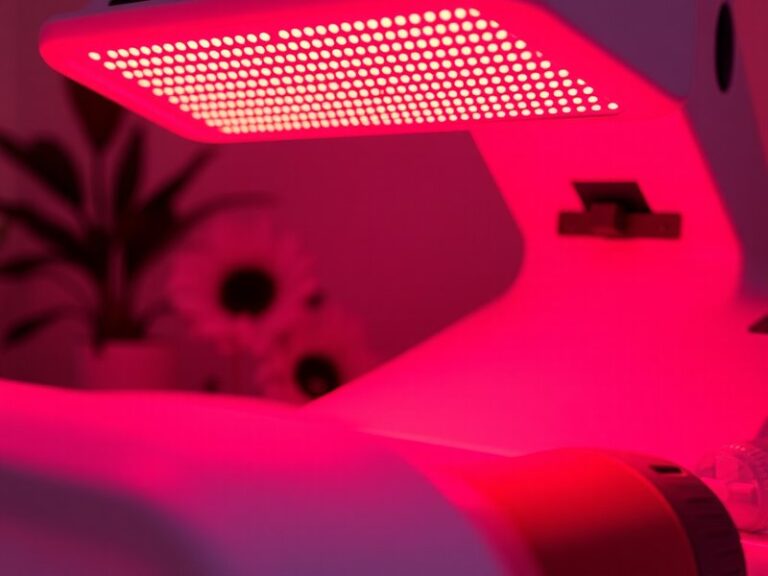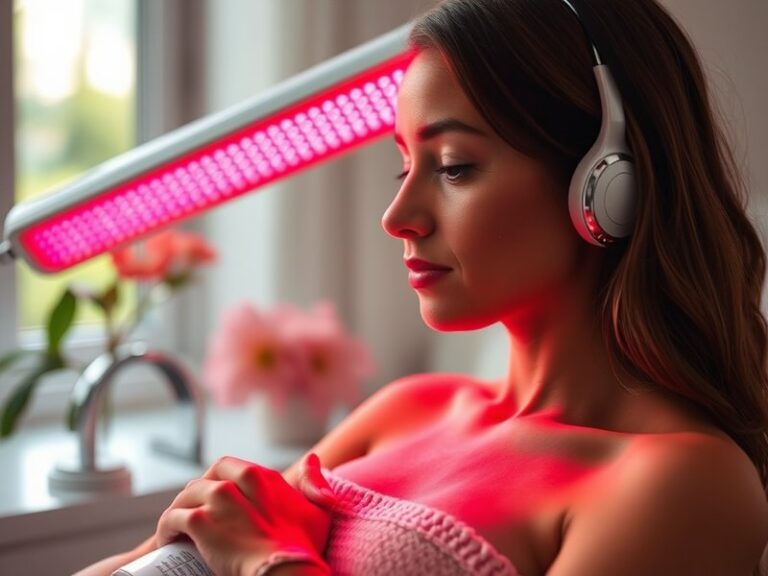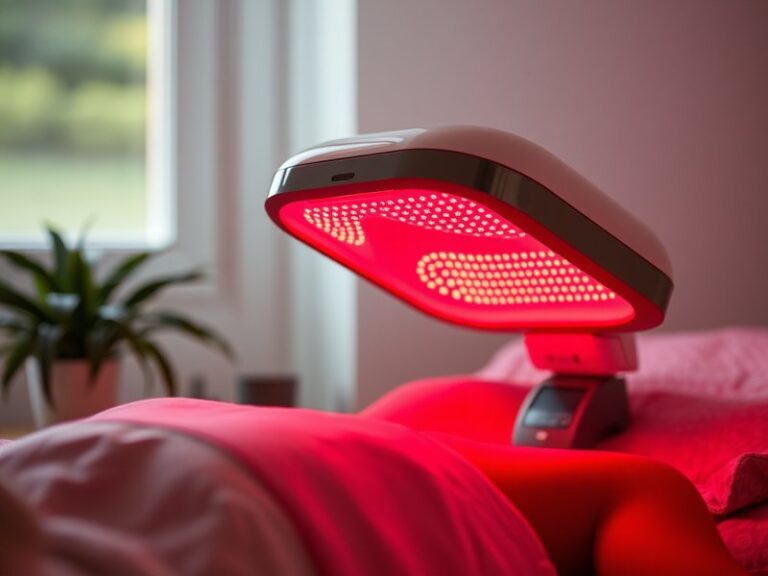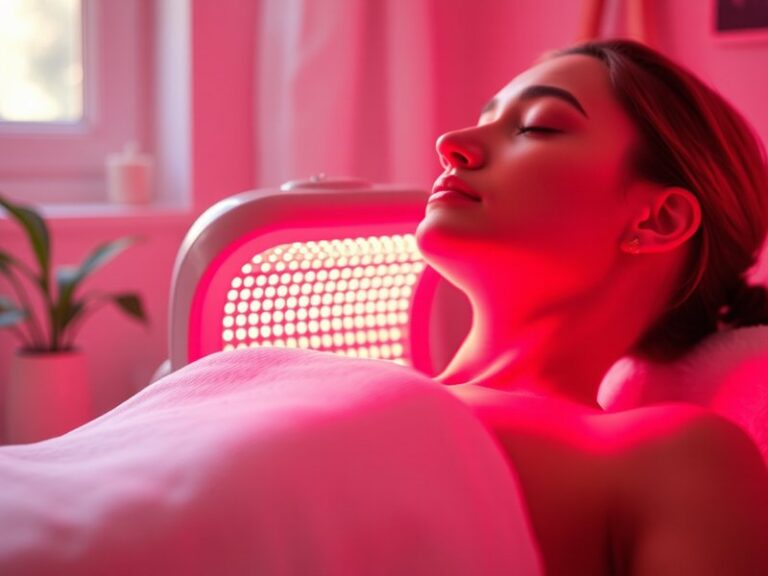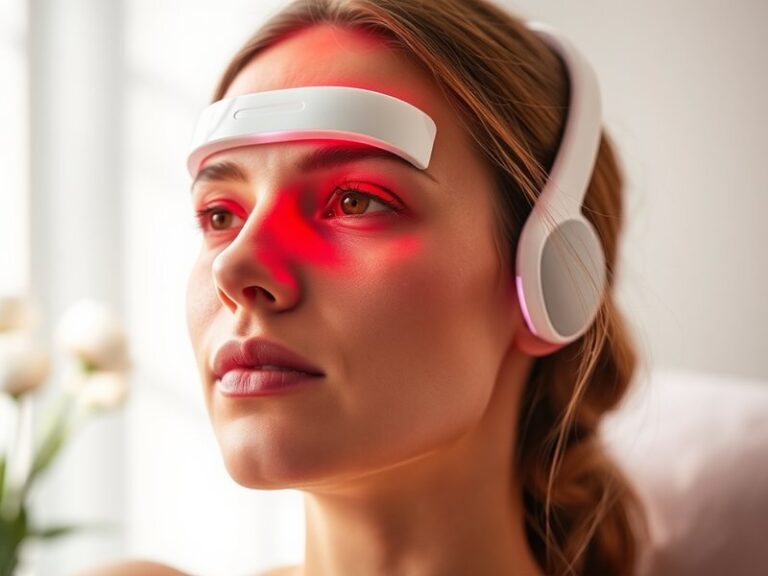Does Red Light Therapy For Wrinkles Work?
Does Red Light Therapy For Wrinkles Work?
Have you ever wished for a wrinkle-free complexion without invasive procedures?
This article will delve into the effectiveness of red light therapy as a treatment for wrinkles, exploring its benefits, potential downsides, and how it compares to other solutions. We aim to provide a comprehensive overview to help you make informed decisions about skin rejuvenation.
Key Takeaways
- Red light therapy uses specific wavelengths of light to stimulate skin rejuvenation and potentially reduce wrinkles.
- Benefits include improved skin tone, increased collagen production, and enhanced healing.
- Alternatives to red light therapy include chemical peels, laser treatments, and topical anti-aging products.
What is Red Light Therapy?
Red light therapy (RLT) is a non-invasive treatment that uses low-level wavelengths of red light to promote various healing processes within the skin. Primarily used in dermatology and aesthetics, RLT works by stimulating cellular function, which can lead to increased collagen production and improved skin tone.
The therapy typically involves the application of red light using specialized devices, either in a clinical setting or at home with portable units. Many users report positive outcomes in skin health, making it an attractive option for those looking to combat signs of aging, particularly wrinkles.
Discover the details in Red Light Therapy Strength?
RLT is thought to work by increasing circulation, promoting cellular repair, and reducing inflammation, which can collectively contribute to more youthful skin.
What are the Benefits of Red Light Therapy?
Red light therapy offers a range of potential benefits, particularly for those looking to improve their skin’s appearance.
Enhanced Collagen Production
One of the primary benefits of red light therapy is its ability to stimulate collagen synthesis. Collagen is a crucial protein that helps maintain skin elasticity and firmness. Increased collagen can lead to a noticeable reduction in the depth and visibility of wrinkles.
Improved Skin Tone and Texture
Many users claim that RLT can lead to a more even skin tone and improved texture by promoting cell turnover and reducing pigmentation irregularities. This can result in a refreshed and rejuvenated appearance, making it a sought-after procedure for aging skin.
Reduction of Inflammation and Healing Time
Red light therapy is known for its anti-inflammatory properties. By reducing inflammation, RLT can help accelerate the healing process for skin blemishes and redness, contributing to an overall healthier complexion.
Non-Invasive and Painless
Unlike many cosmetic procedures, RLT is non-invasive and usually painless. Most users find the treatment relaxing, which is another appealing aspect for those wary of needles or surgical interventions.
Is it Possible to Use Red Light Therapy for Wrinkles?
Yes, red light therapy has been found effective for treating wrinkles, making it a viable option for those looking to reduce the appearance of aging on their skin. Clinical studies have shown promising results in reducing fine lines and improving skin elasticity, making RLT a popular choice among individuals seeking non-surgical anti-aging solutions.
What are the Advantages of Using Red Light Therapy for Wrinkles?
Several advantages come with using red light therapy for wrinkle treatment:
Safety and Minimal Side Effects
RLT is generally considered safe for most skin types with minimal reported side effects, such as temporary redness or dryness. This safety profile makes it a suitable option for many people.
Convenience of Home Use
With the availability of at-home red light therapy devices, users can conveniently incorporate RLT into their skincare routines without needing frequent clinic visits.
Cost-Effectiveness
Compared to ongoing treatments like Botox or fillers, red light therapy can be a more cost-effective long-term solution, particularly for individuals who choose to invest in their own at-home devices.
What are the Disadvantages of Using Red Light Therapy for Wrinkles?
Despite its advantages, there are some considerations regarding red light therapy:
Time Commitment Required
Results from RLT are not instantaneous. Consistent use over several weeks is generally required to see noticeable improvements in wrinkle reduction, which may deter some users from committing to the process.
Variability in Results
Individual responses to RLT can vary significantly. While many report positive outcomes, others may not experience the desired effects. Factors like skin type, age, and underlying skin concerns can influence results.
Initial Investment Cost
While RLT can be cost-effective over time, the initial investment in a professional treatment or home device can be higher than some individuals are willing to spend.
What are the Things to Consider Before Using Red Light Therapy?
If you’re contemplating red light therapy for wrinkles, consider the following factors:
Skin Type and Sensitivity
Understanding your skin type and any sensitivity is essential before starting RLT. Those with specific skin conditions should consult with a dermatologist to determine if this therapy is appropriate for them.
Consistency and Commitment
Successful outcomes require a commitment to regular use. Assess whether you’re willing to incorporate RLT into your routine consistently to achieve the best results.
Researching Equipment and Providers
If you opt for professional treatments or consider purchasing a device, thorough research is advised. Look for reputable providers or manufacturers with positive reviews to ensure quality treatment.
What are the Alternatives to Red Light Therapy for Wrinkles?
Several effective alternatives exist for individuals seeking wrinkle reduction:
Chemical Peels
Chemical peels involve applying a solution to the skin that exfoliates and removes the outer layer, revealing smoother skin underneath. This treatment can significantly reduce wrinkles but may require downtime for recovery.
Laser Treatments
Laser therapy uses focused light beams to stimulate collagen production and improve skin texture. Various laser types cater to different skin concerns, including wrinkles, but they can be invasive and require recovery time.
Topical Anti-Aging Products
Retinoids, peptides, and hyaluronic acid are popular ingredients in anti-aging creams that can help reduce the appearance of wrinkles when applied regularly. These products tend to be less invasive but may take longer to yield visible results.
Botox and Fillers
Injectables like Botox and dermal fillers provide immediate results in wrinkle reduction. However, they require maintenance and may involve more invasive procedures compared to RLT.
Check out our deep dive Red Light Therapy After Microblading?
Conclusion: Is it Recommended to Use Red Light Therapy for Wrinkles?
Based on the information presented, red light therapy can be an effective non-invasive option for individuals looking to reduce the appearance of wrinkles. While results may vary, many users report positive outcomes with consistent use. However, it’s essential to weigh the advantages and disadvantages, consider your commitments, and explore other alternatives to find the best wrinkle treatment for your needs.
Frequently Asked Questions
Does red light therapy hurt?
No, red light therapy is generally considered painless. Many users find the experience soothing, similar to basking in warm sunlight.
How often should I use red light therapy to see results?
To achieve optimal results, it’s typically recommended to use red light therapy about 3-5 times a week, depending on the specific device and treatment plan.
Can red light therapy cause any side effects?
While side effects are rare, some individuals may experience temporary redness or dryness. It’s advisable to follow the device instructions for safe use.
How long does one session of red light therapy last?
Most sessions last between 10 to 20 minutes, depending on the device and treatment area.
Is red light therapy safe for all skin types?
Red light therapy is generally safe for most skin types, but individuals with specific skin conditions should consult a dermatologist beforehand.

